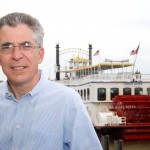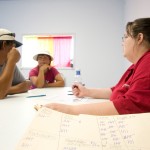You are here
Applying Lessons Learned: Catholic Charities Reaches Out With Lessons from Katrina
This story was gathered during David Snyder's visit to New Orleans. David reports on CDC programs in action for the CDC Foundation.
Like many who lived through Hurricane Katrina, Jim Kelly still vividly recalls the eerie aftermath of the flooding in New Orleans.


“There were no birds. There were no lights. There was no water,” Kelly says. “You cannot imagine what it feels like when a city empties.”
While many in New Orleans were affected by Katrina, Kelly, co-president and chief executive officer of Catholic Charities in the Archdiocese of New Orleans, was in a position to help. As one of the largest community services organizations in the region, Catholic Charities provided critical services to more than 700,000 people impacted by the hurricane. During the weeks after the city flooded, many were running at their maximum capacity to do what they could to help, or connect with those who could.
“After Katrina everyone started to ask, ‘How can we partner? How can we work together?’ You’ve got to do it together and figure it out,” Kelly says. “It’s takes a multitude of different organizations to solve a multitude of problems.”
Armed with that knowledge, leaders like Kelly faced another crisis when the oil spill caused widespread unemployment among coastal fishing families. To assist families impacted by the disaster, Catholic Charities set up emergency relief centers where fishermen could receive emergency food, crisis counseling and other services such as low-interest emergency loans from the Small Business Administration.
“We helped organize recovery efforts for coastal fishing communities,” Kelly says. “Some of the mortgage companies offered relief, so we saw that element of community support.”
Kelly is eager to see post-Katrina New Orleans rebuild, and hopes the lessons learned will contribute to a stronger response in the wake of the oil spill.
“I would advise others facing disasters to do what you can do. Get out there, look at your own gifts and talents, and bring those to the community in need,” Kelly says. “Don’t over plan. Don’t over analyze. Don’t hesitate.”
PROGRAM SNAPSHOT
Purpose:
The Meta-Leadership Summit for Preparedness is a unique national initiative to better prepare business, government and nonprofit leaders to work effectively together during a public health or safety crisis. Through the Summit, leaders learn skills needed for effective action during times of crisis and build organizational connections to strengthen community preparedness for responding to and recovering from emergencies. Learn more at www.meta-leadershipsummit.org.
Funding Partners:
The Summit is supported on the national level by the Robert Wood Johnson Foundation. In lieu of a registration fee for Summit participants, local sponsors cover the Summit’s operational expenses.
Program Partners:
CDC, National Preparedness Leadership Initiative – Harvard School of Public Health
CDC Principal Investigator:
Andrea Young, Ph.D., Office of Public Health Preparedness and Response
CDC Foundation’s Role:
The CDC Foundation is organizing more than 30 Summits in cities across the country to train 3,000 leaders. For each Summit, the CDC Foundation identifies local hosts and sponsors from the business, government and nonprofit sectors and works with them to develop a successful Summit in their community.
